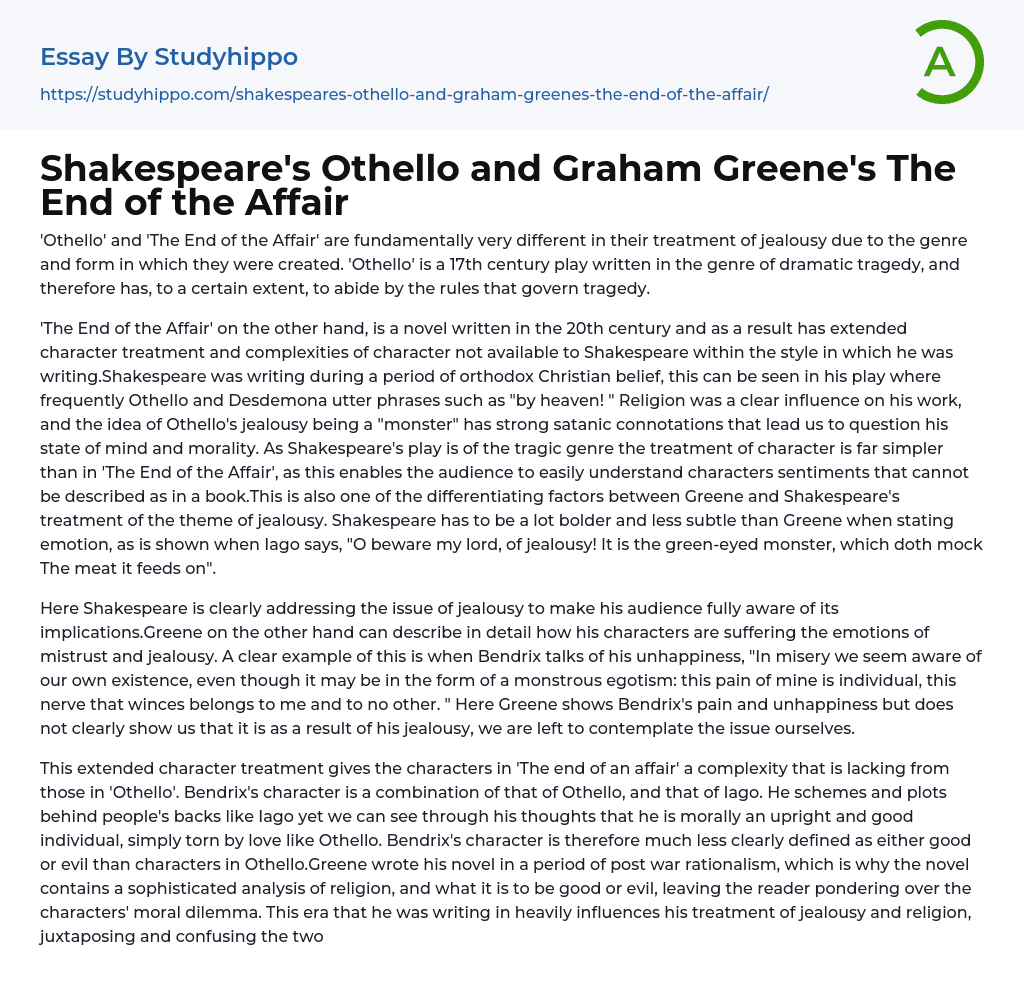

Shakespeare’s Othello and Graham Greene’s The End of the Affair Essay Example
'Othello' and 'The End of the Affair' handle jealousy in contrasting ways, mainly influenced by their genre and form. 'Othello,' a 17th-century tragic play, must adhere to the conventions of tragedy to some degree.
'The End of the Affair' is a novel of the 20th century that offers more intricate character development and complexity than Shakespeare's writing style allowed for. Shakespeare's works were influenced by the orthodox Christian beliefs of his time, as evident in the religious phrases used by characters such as Othello and Desdemona. The concept of jealousy in Shakespeare's play takes on satanic undertones, casting doubt on character morality. The simplicity of Shakespeare's character treatment in his tragic genre allows for easy comprehension by audiences, unlike the nuanced treatment presented in 'The End of the Affair'. This difference highlights how Shakespeare ha
...d to be bolder and less subtle when communicating emotions, as seen with Iago's warning to Othello about the green-eyed monster of jealousy.
In this passage, Shakespeare and Greene both discuss jealousy, but in different ways. Shakespeare uses it as a central theme to convey the impact it can have, while Greene portrays the emotions of mistrust and jealousy through the suffering of his characters. Greene's portrayal of jealousy is evident through Bendrix's words when he speaks of his unhappiness and how it is individual and unique to him. However, unlike Shakespeare, Greene leaves it to the reader to deduce that this unhappiness is due to jealousy.
In 'The end of an affair', the extended character treatment grants the characters a complexity absent in 'Othello'. Bendrix's character is a blend of Iago's scheming and Othello's torn morality. Though Bendrix plots in secret
like Iago, his thoughts reveal a decent and righteous individual, troubled by love like Othello. As such, his character is less overtly defined as good or evil than those in Othello. The novel was written during a time of post-war rationalism, causing Greene to analyze religion and morality with sophistication, leaving readers to ponder his characters' moral dilemmas. The era during which he wrote heavily influenced his treatment of jealousy and religion, often juxtaposing and confusing them throughout the novel.
Bendrix experiences a more abstract sense of jealousy than Othello, as he is uncertain about its intended target. Upon reading Sarah's diary, he realizes that God is his rival, thereby elevating his jealousy to a philosophical matter rather than a simple competition. Othello's jealousy, unlike Bendrix's emotional turmoil, is aimed at Cassio and is thus less complicated and more corporeal. The two authors employ characterisation to illustrate the psychological aspect of jealousy, but Greene, using Bendrix's character, is able to discuss the theme more explicitly.
The writer explains that jealousy is only present when there is desire, a belief that Greene shares. He highlights the use of the phrase "a jealous God" in the Old Testament, linking Bendrix's emotions to his religious beliefs and seeking to rationalize his bitterness. This theme of justifying jealousy appears later in the novel when Mr Savage states that jealousy is a sign of true love. Although this statement may seem insincere, Greene uses it to create empathy with Bendrix's emotions and cause readers to question their own character.
Unlike Shakespeare's plays, the novel 'The End of the Affair' provides a window into Sarah's thoughts. This presents a new approach to jealousy,
as we are able to comprehend it from the viewpoint of the innocent party. Sarah explains Bendrix's jealousy in the following manner: "He is jealous of the past and the present and the future. His love is like a medieval chastity belt: only when he is there, with me, in me, does he feel safe." This perspective presents a unique understanding of jealousy that we never see in the case of Desdemona.
Due to the tangible effect of characters' emotions on others in Greene's novel, jealousy in 'The End of the Affair' appears to be less one-sided compared to 'Othello'. The authors' varying treatments of jealousy stem from the different societies, forms, and ideologies present during their writing.
- Othello Jealousy essays
- A Doll's House essays
- A Midsummer Night's Dream essays
- A raisin in the sun essays
- A Streetcar Named Desire essays
- An Inspector Calls essays
- Death of a salesman essays
- Everyman essays
- Fences essays
- Hamlet essays
- Hedda Gabler essays
- Iago essays
- King Lear essays
- Macbeth essays
- Much ado about nothing essays
- Oedipus Rex essays
- Oedipus The King essays
- Othello essays
- Pygmalion essays
- Romeo And Juliet essays
- Tartuffe essays
- The glass menagerie essays
- The Importance of Being Earnest essays
- The Merchant Of Venice essays
- The Taming of The Shrew essays
- Twelfth Night essays
- Waiting For Godot essays
- Adoption essays
- Aunt essays
- Babies essays
- Bedroom essays
- Caring essays
- Children essays
- Daughter essays
- Divorce essays
- Dog essays
- Dysfunctional Family essays
- Family Tradition essays
- Family Values essays
- Father essays
- Foster Care essays
- Friends essays
- Grandparent essays
- Home essays
- Hometown essays
- Husband essays
- Jealousy essays
- Love essays
- Marriage essays
- Mother essays



